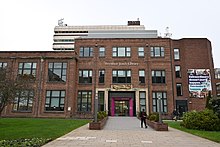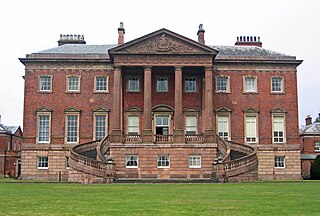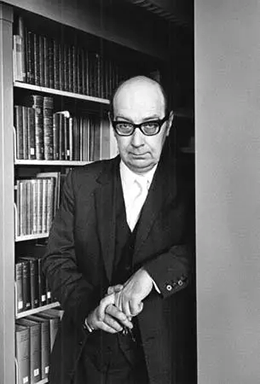
Philip Arthur Larkin was an English poet, novelist, and librarian. His first book of poetry, The North Ship, was published in 1945, followed by two novels, Jill (1946) and A Girl in Winter (1947). He came to prominence in 1955 with the publication of his second collection of poems, The Less Deceived, followed by The Whitsun Weddings (1964) and High Windows (1974). He contributed to The Daily Telegraph as its jazz critic from 1961 to 1971, with his articles gathered in All What Jazz: A Record Diary 1961–71 (1985), and edited The Oxford Book of Twentieth Century English Verse (1973). His many honours include the Queen's Gold Medal for Poetry. He was offered, but declined, the position of Poet Laureate in 1984, following the death of Sir John Betjeman.
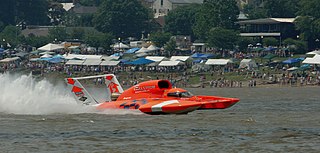
A hydroplane is a fast motorboat, where the hull shape is such that at speed, the weight of the boat is supported by planing forces, rather than simple buoyancy.

The University of Hull is a public research university in Kingston upon Hull, a city in the East Riding of Yorkshire, England. It was founded in 1927 as University College Hull. The main university campus is located in Hull and is home to the Hull York Medical School, a joint initiative with the University of York. Students are served by Hull University Union.
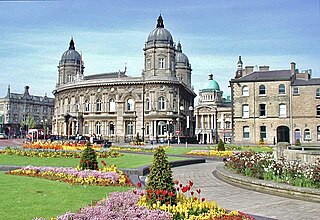
Queen's Gardens is a sequence of gardens in the centre of Kingston upon Hull, England. They are set out within a 9.75-acre (4 ha) area that until 1930 was filled with the waters of Queen's Dock. As the dock was not fully filled in, the gardens are largely below the level of the surrounding streets.

Hull Paragon Interchange is a transport interchange providing rail, bus and coach services located in the city centre of Kingston upon Hull, England. The G. T. Andrews-designed station was originally named Paragon Station, and together with the adjoining Station Hotel, it opened in 1847 as the new Hull terminus for the growing traffic of the York and North Midland (Y&NMR) leased to the Hull and Selby Railway (H&S). As well as trains to the west, the station was the terminus of the Y&NMR and H&S railway's Hull to Scarborough Line. From the 1860s the station also became the terminus of the Hull and Holderness and Hull and Hornsea railways.

Bristol Central Library is a historic building on the south side of College Green, Bristol, England. It contains the main collections of Bristol's public library.

The Port of Hull is a port at the confluence of the River Hull and the Humber Estuary in Kingston upon Hull, in the East Riding of Yorkshire, England.

This is a list of halls of residence both on and off campus at the University of Leeds in Leeds, England.
Brynmor is a given name. Notable people with the name include:

Cardiff Central Library is the main library in the city centre of Cardiff, Wales. It offers a public library service and is open six days a week. Four buildings have been named as such, with the newest building opening on 14 March 2009 and officially being opened a few months later on 18 June 2009 by the Manic Street Preachers. The first Cardiff library was opened in 1861 as the Cardiff Free Library, later expanded and known as the Cardiff Free Library, Museum and Schools for Science and Art.
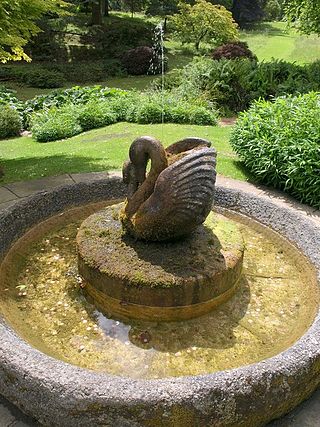
Willi Soukop was a sculptor, member of the Royal Academy and early teacher of Elisabeth Frink. Soukop's work is prominently on display at Hull University in front of the Brynmor Jones Library. Two external Willi Soukop bas-relief sculptures, one of an owl and the other of a human figure signifying the light of knowledge, are located over the main entrance in the older part.
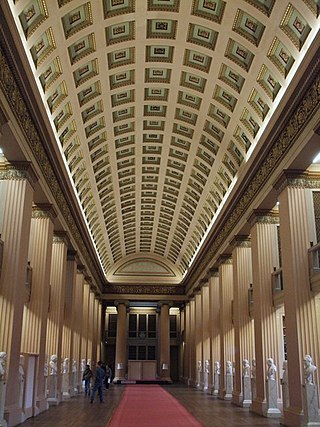
Edinburgh University Library is the main library of the University of Edinburgh and one of the most important libraries of Scotland. The University Library was moved in 1827 to William Playfair's Upper Library in the Old College building. The collections in Edinburgh University Old College were moved in 1967 to the purpose-built eight-storey Main Library building at George Square, one of the largest academic libraries in the world. Today, Edinburgh's university-wide library system holds over 3.8m books, e-books and e-journals in total.

Leeds Central Library is a public library in Leeds. Situated in the city centre, on Calverley Street, it houses the city library service's single largest general lending and reference collection and hosts the Leeds Art Gallery.

The Charles E. Odegaard Undergraduate Library(OUGL) is a library on the campus of the University of Washington in Seattle, Washington. It houses secondary stacks, a learning commons and on-campus technology resources for students, primarily undergraduates. Named after the 19th president of the university, it opened in 1972, replacing the small undergraduate library previously located at Suzzallo Library. It fronts the northwest corner of Red Square and provides access to the parking garage below the plaza, which was built simultaneously with the library. In addition to library space, the building includes a cafeteria and newsstand on the ground floor.

Oakes Park is a privately owned, historic park land in the green-belt area of south Sheffield. It contains 15 private homes as well as a 17th-century English country house which now operates as The Oakes Holiday Centre, a Christian, residential activity centre for young people between the ages of 8 and 18. It is set in extensive grounds which make it very difficult to be seen by the general public. It is situated on Norton Lane in the suburb of Norton within the City of Sheffield in England. The house is a Grade II* listed building, as are several other buildings and features.
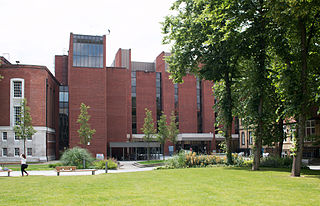
The University of Manchester Library is the library system and information service of the University of Manchester. The main library is on the Oxford Road campus of the university, with its entrance on Burlington Street. There are also ten other library sites, eight spread out across the university's campus, plus The John Rylands Library on Deansgate and the Ahmed Iqbal Ullah Race Relations Resource Centre situated inside Manchester Central Library.
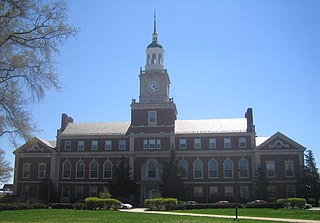
The Founders Library in Washington, D.C. is the main library at Howard University. The building, named The Founders Library in honor of the 17 men who founded Howard University, serves as the iconic symbol of the university. Designed by architect Albert Irvin Cassell, construction began in 1937 during the presidency of Mordecai Wyatt Johnson. As the second library built for the university, the cornerstone was laid on June 10, 1937, and the building was opened for service on January 3, 1939. Today, the library houses over 1 million volumes, the Channing Pollock Theater Collection, and is the home to the Moorland-Spingarn Research Center.
Sir Brynmor Jones was the second Vice-Chancellor of the University of Hull.

